Contents
Deaf Heritage
Deaf Heritage
A Narrative History of Deaf America
Jack R. Gannon
In association with the
National Association of the Deaf
Gallaudet University Press
Washington, DC
Gallaudet University Press
Washington, DC 20002
http://gupress.gallaudet.edu
2012 by Jack R. Gannon
All rights reserved. Published 2011
Printed in the United States of America
Library of Congress Cataloging-in-Publication Data
Gannon, Jack R.
Deaf heritage : a narrative history of deaf America / Jack R. Gannon ; edited by Jane Butler and Laura Jean Gilbert ; layout by Rosalyn L. Gannon.
p. cm.
Originally published: Silver Spring, Md. : National Association of the Deaf, 1981.
Includes bibliographical references and index.
ISBN 978-1-56368-514-9 (pbk. : alk. paper) ISBN 1-56368-514-0 (pbk. : alk. paper) ISBN 978-1-56368-515-6 (e-book) ISBN 1-56368-515-9 (e-book)
1 DeafUnited StatesHistory. I. Butler, Jane. II. Gilbert, Laura Jean. III. Title.
HV2530.G36 2011
305.90820973dc23
2011045806
Originally published in 1981 by the National Association of the Deaf, Silver Spring, MD
Edited by Jane Butler and Laura-Jean Gilbert
Layout by Rosalyn L. Gannon
 The paper used in this publication meets the minimum requirements of American National Standard for Information SciencesPermanence of Paper for Printed Library Materials. ANSI Z39.48-1984.
The paper used in this publication meets the minimum requirements of American National Standard for Information SciencesPermanence of Paper for Printed Library Materials. ANSI Z39.48-1984.
Contents
.
.
.
.
.
.
.
.
.
.
.
.
.
.
.
.
.
.
Foreword
Every book has a reason for coming into being. Basically, it is a response to a long-felt and oft-expressed need for a volume which deals with the contributions of deaf Americans to society.
The heritage was waiting to be recorded. For all its richness, the material on deaf people and deafness had not been tapped. The world of deafness has had its trail-blazers, innovators, statesmen, philosophers, writers, artists, politicians, and reformers. Throughout the years in our country, there have been events of import, deeds of courage, decisions of lasting influence, strokes of brilliance, works of high quality, and moments of gloryall created by deaf people. The need was to capture between the covers of a book as many of them as possible.
Many goals were envisioned for the book. Perhaps the most important one was to present in a cogent form the legacy left to us by the deaf people of generations gone by. It would remind our young deaf people that deafness need not be a barrier to what they can do to enrich the quality of life for deaf citizens everywhere. More importantly, it would make them aware of the rich heritage that has cumulatively been bestowed on them.
The book was sure to come sooner or later. The Centennial Convention is often cited as the reason that the book-writing project got moving. It wasnt. It did, however, provide a powerful impetus toward its development. Yet, the timing of the project couldnt be more favorable. It coincides with the National Association of the Deafs Centennial Celebration in Cincinnati, Ohio, June 30-July 5, 1980.
It remained only for someone to undertake the monumental task of researching the innumerable gems of information and weaving them into the stirring and inspiring volume it finally became. The National Association of the Deaf selected Jack R. Gannon, Director of Alumni and Public Relations at Gallaudet College and Executive Secretary of the Gallaudet College Alumni Association for this job. For him, it was a labor of love. The document clearly reveals it. The National Association of the Deaf owes him a debt it cannot ever repay.
Mention must be made of Gallaudet Colleges contribution to the project. Although Gallaudet College and the National Association of the Deaf perform different roles in serving deaf Americans, they share some common goals. One of these is not only to promote respect for deaf individuals, but also to recognize the contributions of deaf Americans to society. The book is a tangible example of cooperation between the college and the Association. The National Association of the Deaf wishes to express its deep appreciation to Gallaudet College and Dr. Edward C. Merrill, Jr., its president, for providing the time and support for Mr. Gannon to write the book.
The National Association of the Deaf also wishes to express its gratitude to all who in any way, large or small, contributed to the development of the book.
The book is finally here. It has been worth waiting for!
Ralph H. White
President
National Association of the Deaf
Preface 2012
About This Book and a Changing Deaf America
In the late 1970s, the National Association of the Deaf (NAD) and Gallaudet College (now University) jointly sponsored a project to develop a book that would recognize the many accomplishments of the NAD (founded in 1880) as it approached its centennial. Today, Deaf Heritage is considered one of the most comprehensive histories of Deaf people in the United States. It is frequently described as the Roots of Deaf America, and it is credited with initiating Deaf Studies classes in the United States. In 1981 the American Library Association selected Deaf Heritage as one of twenty-one international books written by a disabled (in this case, Deaf) writer. Now, after thirty years with the NAD, and well established as a classic, Deaf Heritage has come home to Gallaudet University where it was researched and written.
During the three decades since Deaf Heritage was published, many changes have taken place in Deaf America. The foremost positive change has been the recognition and acceptance of American Sign Language (ASL) as a legitimate language in the United States. Deaf America truly began to change when ASL received its due, thanks to the pioneering work of Dr. William C. Stokoe. American Sign Language is now being taught in more high schools and postsecondary programs than ever before, an idea proposed and pushed by Deaf leaders back in the nineteenth century, but which very unfortunately (and, pardon the pun) fell on deaf ears. The widespread recognition and acceptance of ASL, along with the presence of more visual information, education, public consciousness and knowledge, and the skills of professional sign interpreters, have given Deaf people access to American society.
Recognition of American Sign Language as a legitimate language led to the growth of more and better awareness of all types of deaf and hard of hearing people. With the publication of Carol Padden and Tom Humphries book, Deaf in America: Voices from a Culture (Cambridge, MA: Harvard University Press, 1988), ASL users learned that all along they had their own culture, which became known as Deaf culture. This eventually led scholars and deaf people to make a distinction between Deaf people (those people who use ASL as their primary language) and deaf people (those people who have a hearing loss but do not sign or identify with Deaf culture). Some people move back and forth between these two groups and still consider themselves deaf.

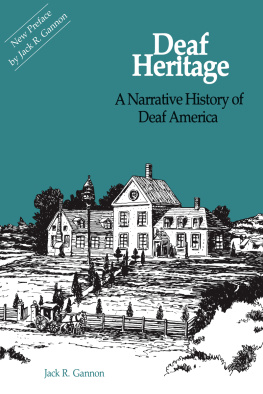
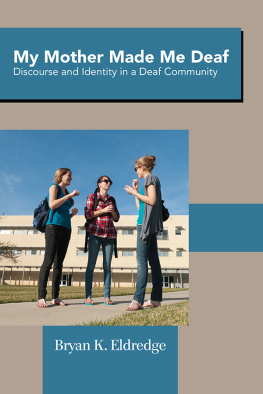
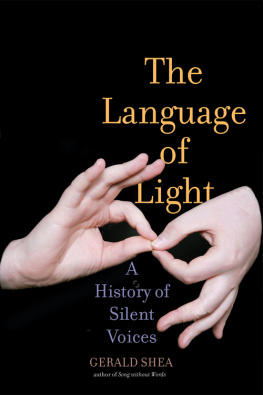
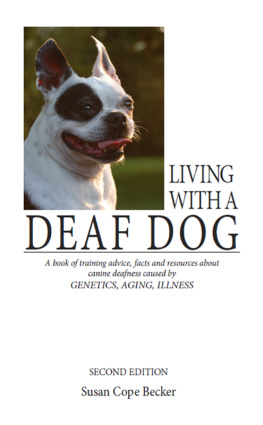
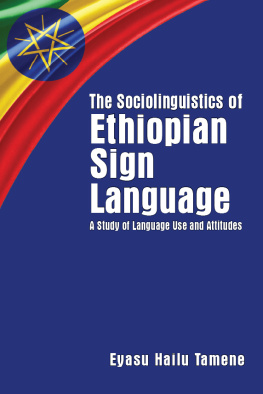
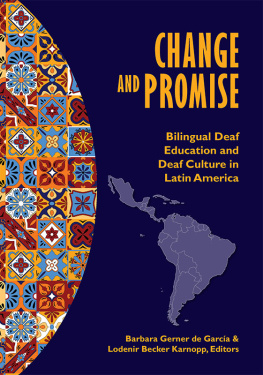



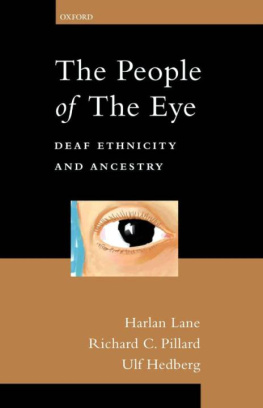

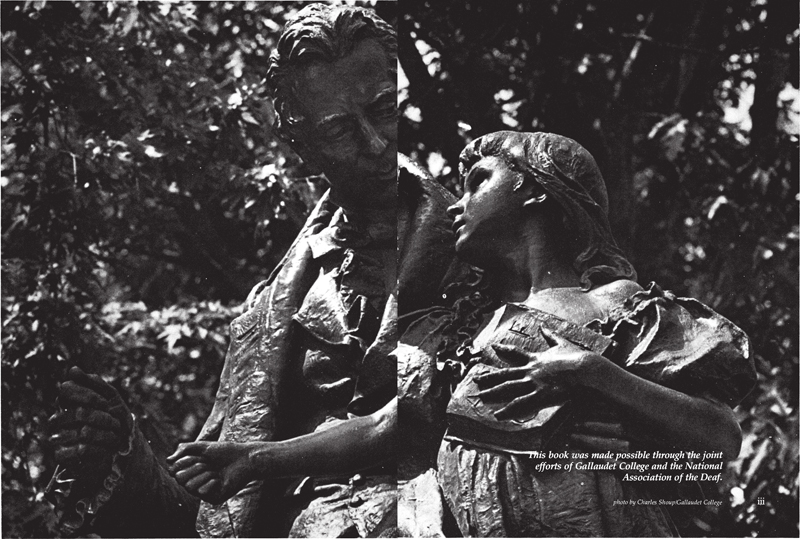
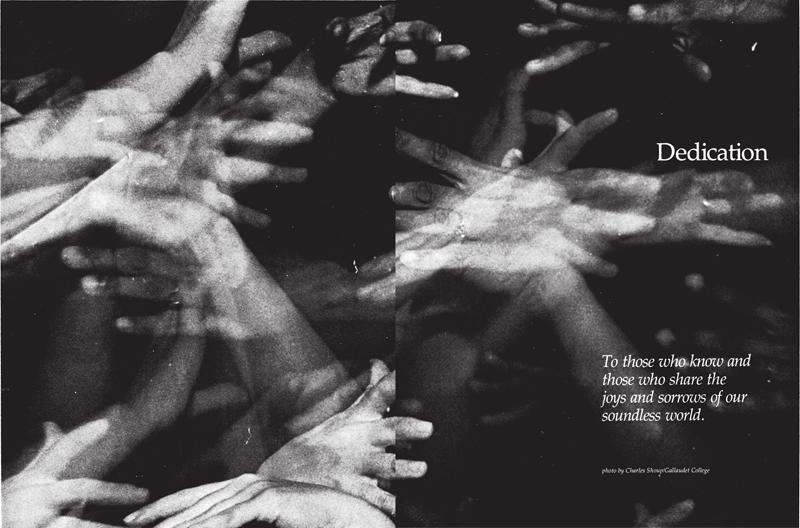
 The paper used in this publication meets the minimum requirements of American National Standard for Information SciencesPermanence of Paper for Printed Library Materials. ANSI Z39.48-1984.
The paper used in this publication meets the minimum requirements of American National Standard for Information SciencesPermanence of Paper for Printed Library Materials. ANSI Z39.48-1984.